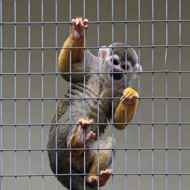'Thousands' of primates kept as pets, charities say

"Primates are long-lived, intelligent and socially complex animals whose needs and welfare requirements are extraordinarily difficult to meet in captivity and when kept privately as pets."
Animal welfare charities say there are an estimated 5,000 primates being kept as pets across the UK, but data suggests many are suffering without their vital social, dietary and environmental needs being met.
A coalition of charities and organisations including the RSPCA, BVA and Born Free Foundation are urging the government to implement a ban on keeping primates as pets.
Rescue groups receive around one call every three days relating to the welfare of pet monkeys. The RSPCA said it received over 300 calls from up and down the country between 2011 and 2015. Greater Manchester was named as a particular problem spot with a total of 34 calls, followed by Greater London, where there were 23 calls.
"The level of calls we are getting to the RSPCA just shows the number of primates that are out there are increasing - and at an alarming level," said Dr Ros Clubb, RSPCA senior scientific officer.
"The spread of calls across the country is a real cause for concern too."
Inspectors report seeing pet monkeys kept in bird cages in dirty conditions, being fed a diet of fast food and sugary drinks, suffering from disease and living without members of their own kind for company.
The charity believes there are thousands of pet primates being kept in the UK. In England, Scotland and Wales, 269 primates were licensed under the Dangerous Wild Animals Act (DWAA) in 2013, according to figures obtained by Wild Futures via freedom of information requests to local authorities.
However, it is thought this could represent just five to 15 per cent of the actual number, due to non-compliance with the act. Including species that were de-listed from the act in 2007, charities estimate around 5,000 primates are being kept as pets.
Sean Wensley, president of the BVA, commented: "Primates are long-lived, intelligent and socially complex animals whose needs and welfare requirements are extraordinarily difficult to meet in captivity and when kept privately as pets.
"For BVA, it would be fitting for governments to recognise and protect the wellbeing of monkeys, and we will continue to call for change to protect the welfare of these intelligent animals by introducing a ban on the private pet-ownership and trade of primates."



 The RCVS has announced a new version of its 1CPD mobile app, with enhanced features for veterinary surgeons and veterinary nurses to record their continuing professional development.
The RCVS has announced a new version of its 1CPD mobile app, with enhanced features for veterinary surgeons and veterinary nurses to record their continuing professional development.